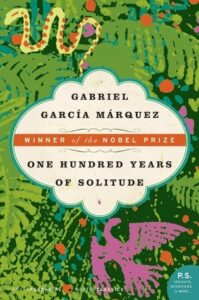
One Hundred Years of Solitude by Gabriel García Márquez is an undisputed classic of magical realism, with a Nobel Prize under its belt and plenty of staying power. And so it’s been on my TBR for a long time. But at the same time, I don’t have a ton of experience with magical realism, so it has always intimidated me a bit. But when my real life book club decided to give it a read, it was the perfect opportunity to pull it off the shelf.
One Hundred Years of Solitude takes place in an isolated small town on the western side of the mountains, somewhere in Latin America, and it follows one prominent family through the generations for one hundred years. There’s not necessarily one driving central plot—unless you count the family repeating the same mistakes, generation after generation—as opposed to a series of interlocking episodes, sometimes surrounding magical happenings, sometimes technological developments, sometimes cultural shifts. There’s ghosts and alchemy here, but there’s also civil war and gringos riding in to exploit the natural resources.
To be perfectly honest, I had a very difficult time immersing in this one, and had it not been a book club selection, I probably would’ve DNF’d in the first hundred pages. The first quarter of the book seems mostly to cover a few failed get-rich schemes and a whole lot of lusty affairs starting an extremely tangled family tree of people who are all named after each other. Later developments make me think there’s some sort of satirical target here, but it’s not one I could easily see, and the unrelenting absurdism didn’t do much to pull me into the story.
As the book progresses, the absurdity sticks around, but some of the targets start to become more recognizable (for a reader with no connection to Latin America). There’s a civil war subplot that carries on a bit longer than I’d have preferred, but there’s some really biting satire around the ways in which the various sides modify their principles to give themselves an edge. It may not have hit me hard from start-to-finish, but there were some tremendous scenes.
The subplot that really does hit me from start-to-finish comes along in the second half of the book, when (US) Americans realize how well bananas grow and start up a plantation, hiring locals to work the farm. Only they only pay the workers in company store credit, which can be used to buy the Virginia hams shipped down from the company’s stateside partners. Eventually, the workers strike, prompting the company to defend itself on the grounds that it doesn’t have any workers. I won’t spoil how the subplot ends, but it’s by far the most emotionally hard-hitting for me, with the magical realism used to full effect and the dark, absurdist humor not relenting one bit.
Were this subplot separated from the rest of the novel and made into a standalone novella, it might truly be a must-read in my eyes. Unfortunately, it’s difficult to extricate from a book that jumps back and forth between subplots and isn’t especially concerned with chronology. If you’re not engaged in watching various family members repeatedly ruin their lives, it’s going to be hard to stick around long enough to get to the brilliance. So it’s no surprise that when I showed up to my book club discussion, all but two of us had DNF’d before getting to what I thought was far and away the best part.
And that illustrates why this book as a whole is such a mixed bag for me. There are sections that are tremendous, and those sections are good enough to convince me that Márquez is a talented writer with an acerbic wit. But even if it’s my own lack of cultural knowledge that keeps me from enjoying the beginning and the end of the book, well, I still didn’t enjoy the beginning or the end of this book. I can appreciate the way the stories parallel each other across the generations, or how the concerns about incest in the very first stages of the story come right back at the end. But watching a series of relatives destroy their lives with various affairs and obsessions just never captured my attention, and whatever deeper meaning there is in those sections is opaque to me.
And so I’m not scoring this book very highly. But my scores are subjective, and this is a book that will hit people very differently depending on their own preferences and background knowledge. If it sounds up your alley, do not let my low score deter you. If not—I don’t know, read the bit about the bananas.
Recommended if you like: magical realism, plotless Latin American social satire.
Can I use it for Bingo? It’s hard mode for Set in a Small Town and Multi-POV. While I’ve returned my copy to the library, I’m about 99% sure it features Dreams and a Character with a Disability.
Overall rating: 12 of Tar Vol’s 20. Three stars on Goodreads.
